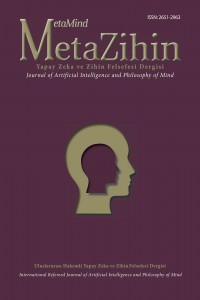Descartes'ın Zihin Teorisi ve Sınırları
Bu çalışma Descartes’ın düşünen şey olarak zihin tanımından çıkabilecek kimi sonuçları ortaya koymayı amaçlamaktadır. Descartes’ın töz düalizmi olarak bilinen görüşü, çağdaş zihin felsefesinin en önemli sorunlarından birini ortaya çıkarır. Descartes zihni düşünen bir töz olarak kabul etmiştir. Çağdaş zihin felsefesindeki teorilerin büyük çoğunluğu Descartes’ın tözsel zihin anlayışına bir eleştiri niteliğindedir. Descartes’ın tözsel zihin anlayışına karşı yapılan eleştirilerin merkezinde zihin felsefesinde ontolojik sorun diye bilinen zihin-beden sorununun bulunduğu söylenebilir. Bu bağlamda önce Descartes’ın zihin teorisi olarak düşünülebilecek olan cogito argümanı ortaya konulacaktır. Descartes zihin ile bedeni birbirinden keskin bir şekilde ayırdığı için zihin ile beden arasındaki nedenselliği de açıklanamaz kılmıştır. İkinci olarak ele alınacak sorun bu argüman bağlamında bilincin ne olduğu sorunudur. Descartes’a göre zihnin özsel niteliği düşünme olduğundan çeşitli bilinç olgularını düşünme başlığı altında toplamıştır. Zira düşünme bilinci gerektiren bir fiildir. Descartes’ın zihnin doğasına ilişkin düşünceleri bilinci düşünmenin özdeşliği olarak ele aldığını göstermektedir. Descartes’ın düşüncelerinden zihnin ayrı başına bir kendilik olduğu değil, bütün zihinsel hallerimin birliği olduğu sonucu çıkar.
Descartes’ Theory of Mind and Its Limits
This paper attempts to lay bare the problematic consequences of Descartes’ attempt to define the mind as a thinking subject. Descartes’ substance dualism creates one of the central problems in the contemporary philosophy of mind. Descartes considers the mind to be a thinking substance. His conception of the “substantial mind” is often challenged by contemporary philosophers of mind, and their criticism tends to focus especially on the mind‑body problem, which of course is an ontological problem. In this regard, I will provide a critical examination of the cogito argument, which can in large measure be identified with Descartes’ theory of the mind. In drawing a sharp distinction between the mind and the body, Descartes renders their interaction unexplainable. A second problem concerns the question of what, precisely, consciousness is in the context of this argument. According to Descartes, the essential attribute of the mind is thinking, and he therefore employs the term ‘thinking’ to refer to various phenomena, all of which can be identified with consciousness. This is because thinking presupposes consciousness. Descartes’ conception of the nature of the mind shows that he considers consciousness to be the identity of thinking. It can be concluded from Descartes’ remarks that the mind is not a separate self but rather the unity of all mental states.
___
- Chomsky, N. (2006). Language and Mind. New York, NY: Cambridge University Press.
- Churchland, P. (2012). Madde ve Bilinç. Çev. Berkay Ersöz. İstanbul: Alfa Yayınları.
- Descartes, R. (2013[1638]). Yöntem Üzerine Konuşma. Çev. Çiğdem Dürüşken. İstanbul: Kabalcı Yayınları.
- Descartes, R. (1973). The Philosophical Works of Descartes, Vol. I. (9. Baskı). Çev. E. S. Haldane & G. R. T. Ross. New York: Cambridge University Press.
- Gözkân, B. (2012). “Frege ve Aritmetiğin Temelleri.” Aritmetiğin Temelleri içinde (s. 13-69). İstanbul: Yapı Kredi Yayınları.
- Gür, A. (2015). “Descartes’ın Şüphe Argümanı ile Hume’un Kuşkucu Tavrı Arasındaki Fark Üzerine Bir deneme.” Özne, 23(Güz): 289-299.
- Kant, I. (1998[1787]). Critique of Pure Reason. Çev. ve Der. Paul Guyer & Allen Wood. New York: Cambridge University Press.
- Ryle, G. (2011). Zihin Kavramı. Çev. Sara Çelik. İstanbul: Doruk Yayıncılık.
- Searle, J. (2002). Consciousness and Language. New York: Cambridge University Press.
- Wood, L. (1932). “Descartes’ Theory of Mind.” The Philosophical Review, 45(5): 466-477. DOI: 10.2307/2180061
